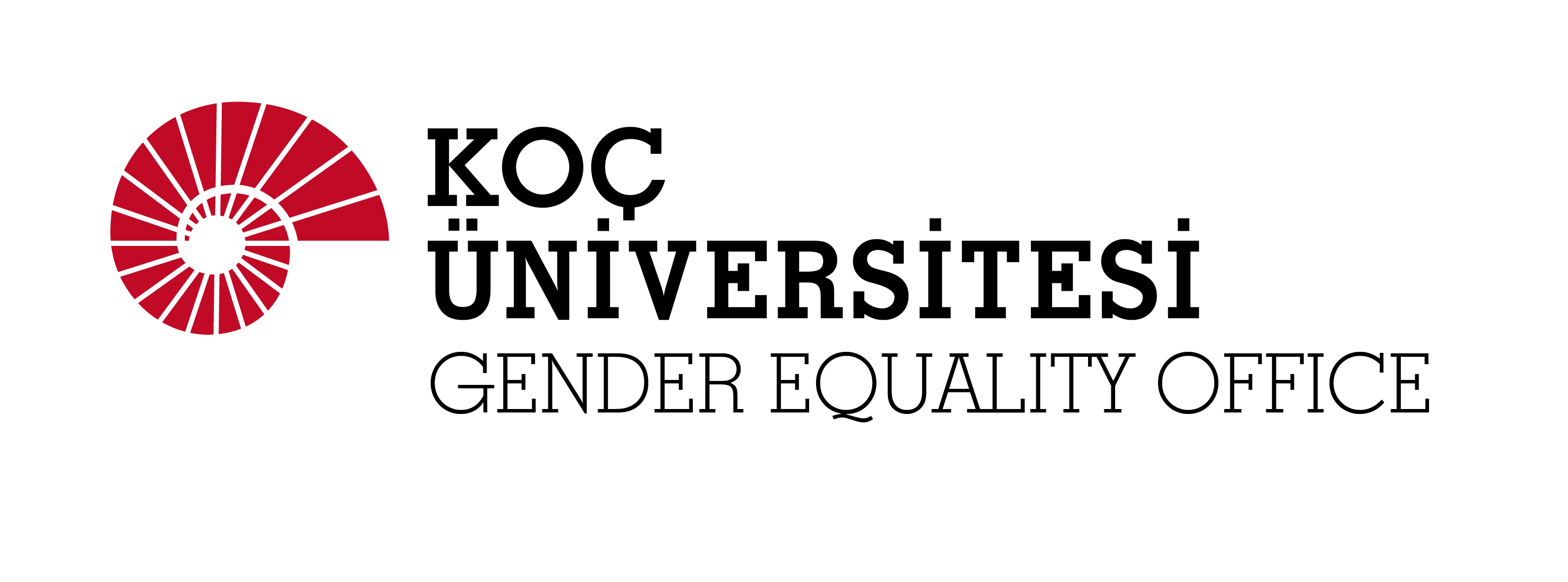Feminists in the Making: Developing ASIU 117 at Koç University
Gülşah Şenkol
I dedicate this piece to my kind, funny and brilliant students.
They taught me more than I did them.
“ASIU 117: Women and Gender in Literature” is a growing tradition. It all started with fifty students, one section, and one confused lecturer who came to Istanbul from the US for a one-year postdoc at ANAMED, and yet could not return home when the pandemic happened. During the summer of 2020 I found myself teaching a group of students who seemed equally confused for various reasons. A lot has happened since that first class. Just when things were just starting to feel normal again, we were all deeply saddened by the massive earthquakes that shook Turkey and northern Syria, and we had to struggle with feelings of grief and loss. We took shelter in reading, discussing, and learning from each other. Our lives changed in the process, as did we. But the students’ interest in the course persisted. Despite the heavy reading load, the number of students enrolled continued to rise, with the number of sections multiplying every semester. This fall, we finally opened a fifth section, with 320 students enrolled, and had to ask the Registrar’s Office to bring extra chairs to the classroom. None of us are confused anymore, or maybe less so. We were anchored in literature, as stable as it is, and we endured.
I structured this course in an interactive seminar format. Students first (sometimes grudgingly) read challenging theoretical texts, such as Mikhail Bakhtin and Georg Lukács’s The Theory of the Novel, and then continue with the most current literature such as Timothy Bewes’s Free Indirect: The Novel in a Postfictional Age, published only last year. We discuss the basics first, what makes a novel a novel; what distinguishes a novel from other literary forms; how a novel registers a thought; whether our perceptions of a novel remain separate from the author’s intentions of the work; whether (as the podcast Public Books 101 frames it) a novel meaningfully helps us understand the pain that we and others endure, or whether reading fiction inspires little more than navel-gazing; and whether novels illuminate the power structures that shape our lives, or if they tend to numb us to the political challenges we face. These preliminary questions help students think critically and in-depth as they approach a text.
We then delve into the novels themselves, five per semester. Drawing on the comparative and transnational focus of my own research, I designed this course to analyze and problematize women’s relationship with identity, culture, and society across different backgrounds and norms, ranging across Türkiye, Egypt, Iran, Canada, Japan, France, the United Kingdom, and the United States. We discuss how the novels feature sexuality, femininity, gender norms, and societal expectations. What starts as grumbling about the reading load at the beginning of each semester usually gets replaced with confidence to read longer texts in a much shorter time, and much more effectively. I was pleasantly surprised, when one student, in a burst of inner confidence after noticing how developing a healthy habit of reading had changed her life for the better, also quit smoking.
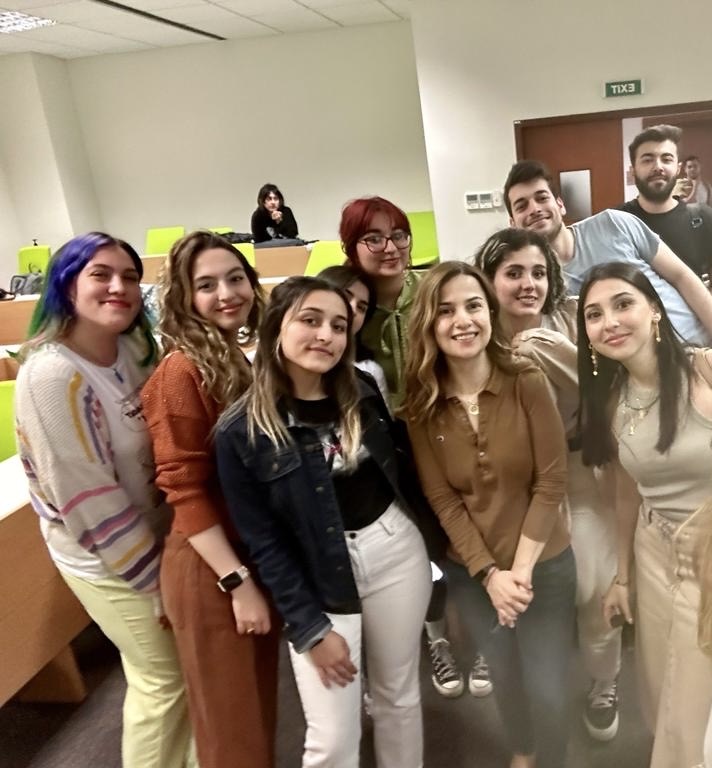 The most rewarding part of this course is the opportunity for students to discuss each novel with either its author or with literary scholars via Zoom. The guest list for this course has included the most prominent, globally known writers, some of whom are Pulitzer Prize winners or were either shortlisted or longlisted by the Booker Prize. We try to schedule these writer talks every two weeks to discuss their works as well as Turkish literature more broadly from a comparative and global context. Discussing the novels with scholars who study these writers has been an equally rewarding experience for the students, and we are truly grateful and forever in debt for the intellectual generosity of our guests who accepted our invitation and joined the course without any hesitation.
The most rewarding part of this course is the opportunity for students to discuss each novel with either its author or with literary scholars via Zoom. The guest list for this course has included the most prominent, globally known writers, some of whom are Pulitzer Prize winners or were either shortlisted or longlisted by the Booker Prize. We try to schedule these writer talks every two weeks to discuss their works as well as Turkish literature more broadly from a comparative and global context. Discussing the novels with scholars who study these writers has been an equally rewarding experience for the students, and we are truly grateful and forever in debt for the intellectual generosity of our guests who accepted our invitation and joined the course without any hesitation.
So far, we have hosted Ahdaf Soueif from Egypt, Shokoofeh Azar from Iran, Sheila Heti from Canada, Sayaka Murata (together with Ginny Tapley Takemori, the award-winning translator of her novel) from Japan, and Elif Batuman from the United States. We also hosted prominent scholars from the U.S., U.K. and Türkiye, whose work focused on the authors we read within the scope of this course. These include Professors Melissa Bilal (University of California, Los Angeles), Morgane Cadieu (Yale University), Maureen Freely (Warwick University), Roberta Garrett (East London University), Victoria Rowe Holbrook (Princeton University, retired), Lee Konstantinou (University of Maryland, College Park), Erik R. Lofgren (Bucknell University) and Mesut Varlık (Bilgi University), amongst many others. We were also fortunate enough to host a couple of close acquaintances of the writers themselves who made a great effort to publish the writer’s works, such as Funda Soysal—the daughter of Sevgi Soysal—and Ateş Orga—İrfan Orga’s son.
 Organizing these meetings is always a challenge, for obvious reasons, but it surprises me every time how generous all the writers and scholars we have hosted have been in sharing their knowledge and experience with students who are so many miles away. Together, we made it happen. All the guest speakers we hosted kindly agreed to meet us, sometimes even as early as 7:00 AM or as late as 10:00 PM on their end, to accommodate the time difference between their respective locations and ours. Sometimes, there are additional challenges: on one occasion we had to find translators to make the meeting happen – as in the case with Sayaka Murata, in which two graduate students from Tokyo and Kyoto kindly agreed to do consecutive translations from Japanese to English and vice-versa to discuss Murata’s novel The Convenience Store Woman, the winner of the prestigious Akutagawa Prize. (Six people joined the meeting from Japan via Zoom that day: Sayaka Murata, Ginny Tapley Takemori, the editor-in-chief, the head of the publishing house and our two translators.)
Organizing these meetings is always a challenge, for obvious reasons, but it surprises me every time how generous all the writers and scholars we have hosted have been in sharing their knowledge and experience with students who are so many miles away. Together, we made it happen. All the guest speakers we hosted kindly agreed to meet us, sometimes even as early as 7:00 AM or as late as 10:00 PM on their end, to accommodate the time difference between their respective locations and ours. Sometimes, there are additional challenges: on one occasion we had to find translators to make the meeting happen – as in the case with Sayaka Murata, in which two graduate students from Tokyo and Kyoto kindly agreed to do consecutive translations from Japanese to English and vice-versa to discuss Murata’s novel The Convenience Store Woman, the winner of the prestigious Akutagawa Prize. (Six people joined the meeting from Japan via Zoom that day: Sayaka Murata, Ginny Tapley Takemori, the editor-in-chief, the head of the publishing house and our two translators.)
Because these meetings are structured as less of a lecture and more of a friendly discussion, everyone is energetic and engaged. Our meetings with Ahdaf Soueif—who divides her time between Egypt and the UK, and whose Map of Love was short-listed for the Booker Prize—and Shokoofeh Azar—who moved to Australia as a political refugee and became the only Iranian writer nominated for the Booker Prize with her debut novel The Enlightenment of the Greengage Tree—were incredibly memorable experiences given the politicization of the woman’s question in Egypt and Iran respectively. Our conversations with Sheila Heti and Elif Batuman inspired and also challenged students to think more critically about the politics of love, the institutionalization of motherhood, and the politics of a feminist self from a comparative perspective. Discussing Zabel Yessayan’s The Gardens of Silihdar with Professor Melissa Bilal from UCLA and Leylâ Erbil’s A Strange Woman with Professor Victoria Rowe Holbrook likewise made a lasting impression. Our meeting with Funda Soysal and Maureen Freely to discuss Sevgi Soysal’s most recently translated novel Dawn (Şafak) was much more than a meeting – it was an experience, one we could never forget. It was scheduled to last an hour but continued for almost three hours. We all had an inspiring conversation about how we can pay, in Sumi Madhok’s words, our “feminist debt,” to Sevgi Soysal properly, and how we can do justice to her memory and legacy. Funda kindly shared with us the letters that Sevgi Soysal wrote to Mümtaz Soysal, her husband through a Zoom screen. It was one of those moments when technology enables (interaction) and disables (a hug). Ninety students attended that meeting and stayed until the end.
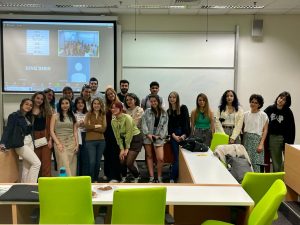 These meetings not only helped the students’ intellectual growth but also their personal growth by increasing their self-confidence. Following the meeting with Prof. Morgane Cadieu from Yale University for example, one student expressed how amazed she was to see a Yale professor taking notes when the students were asking her their questions, and how generous it was of Prof. Cadieu to thank the students for accommodating her schedule to organize the meeting. Sometimes, such small acts of generosity resonate profoundly with the students and stay with them forever. The writers, the scholars, the translators, the literature agencies, and the publishing houses all contributed immensely to make these meetings happen, and we have always shared the workload for our common objective: the intellectual growth of the students, who are our future. And there is still more to come. Our first confirmed guests for the Fall semester are Gülşat Aygen, Professor of Linguistics at the Northern Illinois University, and Prof. Marcia C. Inhorn, Professor of Anthropology and Chair of the Council on Middle East Studies (CMES) from Yale University. We are getting ready for these meetings as I type this essay, and we are all very excited.
These meetings not only helped the students’ intellectual growth but also their personal growth by increasing their self-confidence. Following the meeting with Prof. Morgane Cadieu from Yale University for example, one student expressed how amazed she was to see a Yale professor taking notes when the students were asking her their questions, and how generous it was of Prof. Cadieu to thank the students for accommodating her schedule to organize the meeting. Sometimes, such small acts of generosity resonate profoundly with the students and stay with them forever. The writers, the scholars, the translators, the literature agencies, and the publishing houses all contributed immensely to make these meetings happen, and we have always shared the workload for our common objective: the intellectual growth of the students, who are our future. And there is still more to come. Our first confirmed guests for the Fall semester are Gülşat Aygen, Professor of Linguistics at the Northern Illinois University, and Prof. Marcia C. Inhorn, Professor of Anthropology and Chair of the Council on Middle East Studies (CMES) from Yale University. We are getting ready for these meetings as I type this essay, and we are all very excited.
ASIU 117 attracts students from multiple disciplines, not only from the social sciences and humanities, but also from science, technology, engineering, and mathematics (STEM), as well as the medical school and the school of nursing. Last spring, I received a KOLT Teaching Improvement Grant, to develop ASIU 117 further, and organized two sessions with the Stanford University Literary Lab and the Fortext Lab at the Technical University Darmstadt on a project “Network Analysis, Literature, and Digital Humanities.” Each session introduced our students to computational literary analysis and to innovative approaches to studying literary texts such as macroscopic literary inquiry. Both labs have developed new methods to handle vast amounts of literary texts, revealing new patterns and insights across sources beyond what a single researcher or even group of researchers can accomplish. My students, especially those who felt reserved and skeptical of the “science of literature,” were more convinced by the potential benefits of integrating conventional literary approaches with digital literary studies by the end.
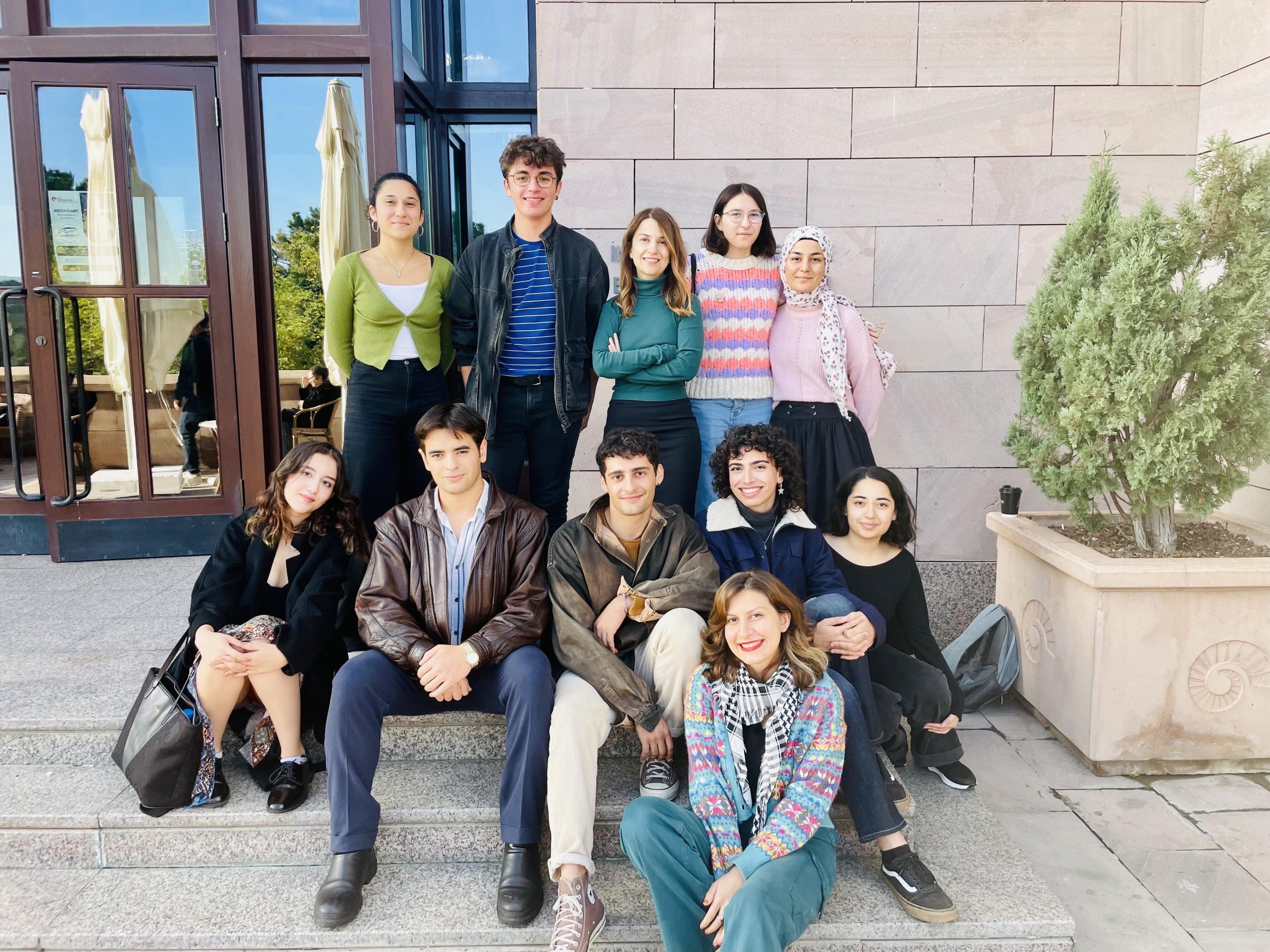
We organized the second session with Prof. Evelyn Gius, a Professor of Digital Philology and Modern German Literature at Technical University Darmstadt and head of the Fortext Lab. Prof. Gius gave a seminar on how gender can be used in computational literary studies. In her seminar, Prof. Gius introduced what she described as “the process of operationalizing gender,” utilizing “a formal representation of gender-related attributes” as an example. Prof. Gius then provided an overview of “the connection between a phenomenon and its textual analysis” in the context of CLS. Finally, Prof. Gius concluded with some exemplary approaches from CLS for the study of gender in literary works, and then invited the students to explore different innovative approaches to the analysis of gender and to discuss the possible ways in which these approaches might take digital form in the context of state-of-the-art technologies.
These joint sessions therefore created a great learning environment for the students to discuss the most recent debates in the field: “Can an approach to literature informed by social science produce significant historical results by itself — with or without computers? Are computational methods, by themselves and without a social scale of inquiry, enough to transform literary history?” Some of my students at ASIU 117 prepared a final written assignment focusing on what they have learned through these scholarly exchanges with the directors of both labs at Stanford University and TU Darmstadt. The goal was to learn innovative ways to understand literature and approach literary texts through the ways in which these labs analyze massive amounts of data through computational methods. The students concluded that the motives and methods which CLS use diverge less from conventional literary studies than detractors sometimes imagine.
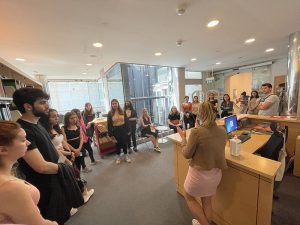 Extracurricular Activities:
Extracurricular Activities:
ASIU 117 also included two extracurricular activities: a BiblioPera tour and a graduate school application workshop.
The BiblioPera tour was a way to introduce the students to the BiblioPera initiative and the research centers and libraries that are part of this great network. The students rarely leave campus or Sarıyer, and thus miss out on the vibrant, stimulative atmosphere of intellectual exchange in Beyoğlu, and the great opportunities that these research centers have to offer. Many of them believe that these research centers have launched programs for graduate students or scholars but not for undergraduate students such as themselves, so the tour was a way to better connect them to this research network. We organized a full day tour from 9:00 AM until 4:00 PM, and, thanks to the efforts of our dear Gizem Bekil on our behalf, the university arranged transportation from campus to Beyoğlu and back for all of the students.
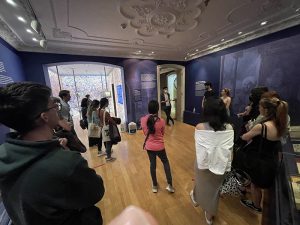 During our program, we visited eight of Bibliopera’s participating institutions on a very tight schedule. The directors and librarians of each of the institutes gave the students a half hour-long introduction to the center, the events and activities they organize year-round, information on how they can engage with these activities, overviews of their library collections, and advice on how to make best use of them. I would like to thank each and every one of these institutes for their warm hospitability for taking the time to meet with the students and to give them a full tour of their respective research centers. I would especially like to thank Çiğdem Yıldırım and Buket Coşkuner from ANAMED, Mehmet Kentel from IAE, Aysel Arslan and Fokke Gerritsen from NIT, Bayram Balcı from IFEA, Zeynep Simavi from ARIT, Olof Heilo and Anders Ackfeldt from SRII, and the Director of the Yapı Kredi Library. SRII, moreover, provided a wonderful breakfast for the students in their garden at the beginning of our tour, for which we remain enormously grateful. At the end of the program, students had a guided tour led by Şeyda Çetin and Ebru Esra Satıcı, the two wonderful curators of the exhibition, “I-You-They: A Century of Artist Women” (Ben-Sen-Onlar: Sanatçı Kadınların Yüzyılı) in Meșher.
During our program, we visited eight of Bibliopera’s participating institutions on a very tight schedule. The directors and librarians of each of the institutes gave the students a half hour-long introduction to the center, the events and activities they organize year-round, information on how they can engage with these activities, overviews of their library collections, and advice on how to make best use of them. I would like to thank each and every one of these institutes for their warm hospitability for taking the time to meet with the students and to give them a full tour of their respective research centers. I would especially like to thank Çiğdem Yıldırım and Buket Coşkuner from ANAMED, Mehmet Kentel from IAE, Aysel Arslan and Fokke Gerritsen from NIT, Bayram Balcı from IFEA, Zeynep Simavi from ARIT, Olof Heilo and Anders Ackfeldt from SRII, and the Director of the Yapı Kredi Library. SRII, moreover, provided a wonderful breakfast for the students in their garden at the beginning of our tour, for which we remain enormously grateful. At the end of the program, students had a guided tour led by Şeyda Çetin and Ebru Esra Satıcı, the two wonderful curators of the exhibition, “I-You-They: A Century of Artist Women” (Ben-Sen-Onlar: Sanatçı Kadınların Yüzyılı) in Meșher.
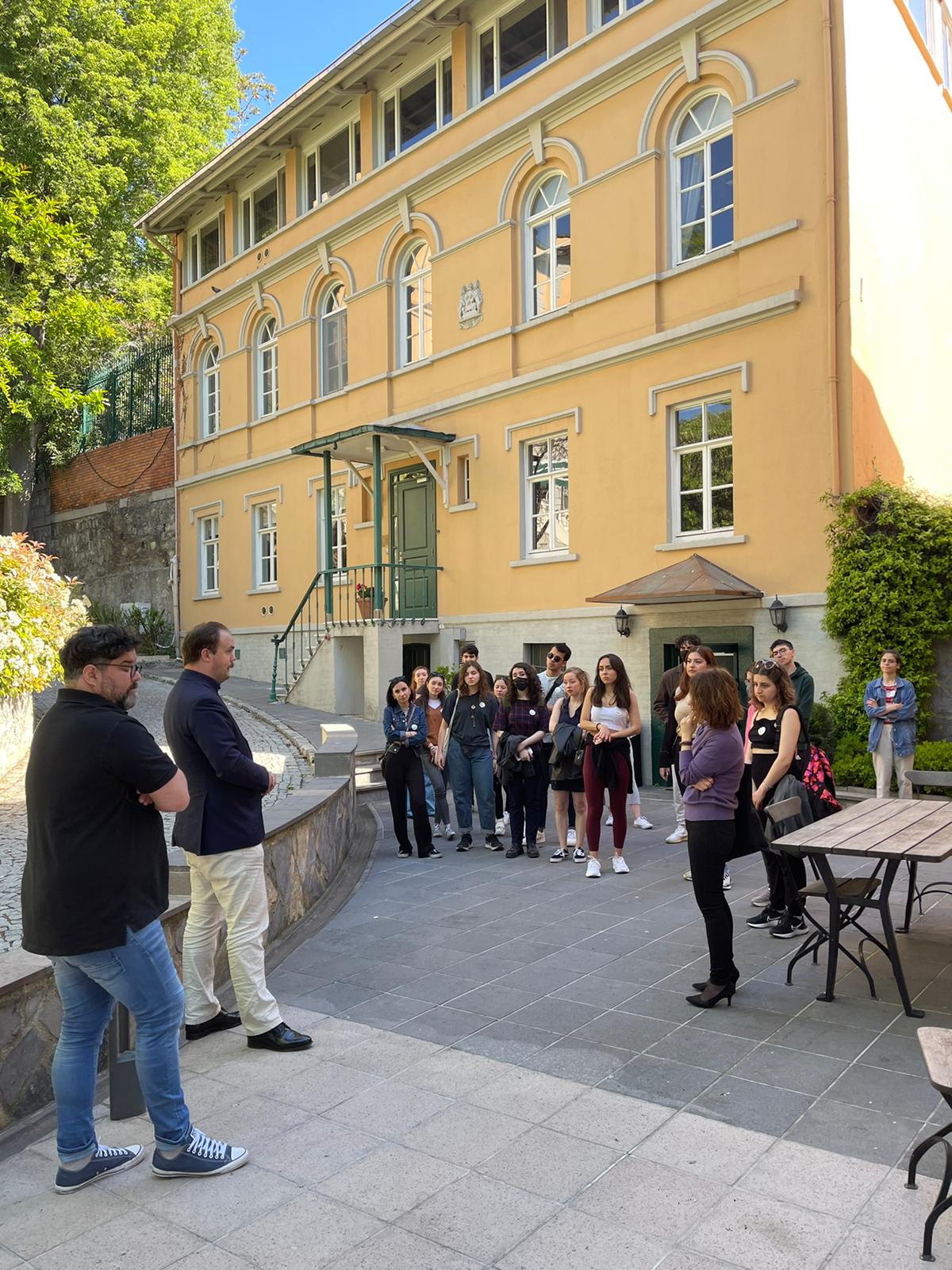
ASIU 117 continues to give me the opportunity to work with amazing students, semester after semester, who each bring to the course their own unique experiences, ensuring that we all grow together, individually and as a class.
This semester, one student convinced me to let him join the course from the waitlist. When I told him that there is no seating available in the classroom, that I already have 360 students enrolled between the two courses, and that I cannot possibly grade even another single paper, he responded almost immediately that he would bring his own chair to the classroom and that he would grade his own paper so as not to become a burden!
I let him in.
Students at Koç University are eager to learn. I feel so fortunate to have this space – to teach, to think with my students, and to learn even more back from them. I am still in the early stages of my teaching career, and I will probably revise and adapt my teaching philosophy (if there is such a thing) in the years to come, but one thing will always remain the same: I will not waver in having unconditional trust in my students. I will keep on investing in them, in their future, and in their potential to make a change. They built this firm confidence that I have in them deep within me, and I genuinely could not ask for a better group of students than we have here at Koç.
İyi ki varsınız, çocuklar!
What Students Say:
Alara Gürel
Women and Gender in Literature course has changed and improved my view of life. I started reading again, especially fiction. I got to hear the voice of women from very different backgrounds. The way I view myself, and the women around me has changed for the better. Lastly, Gülşah Hoca opened the doors of the world for us to learn. She invited multiple guest speakers and authors for our class who were all from prestigious universities. It was a privilege to be her student and to be able to take this class. I can’t thank her enough.
Doğa Şendil
I enrolled to ASIU117 to explore the concept of Gender Equality. While achieving this, I also got to meet with important writers and academicians. For instance, our meeting with Sheila Heti, author of one of our novels, Motherhood, encouraged me to think more about the struggles of being a woman in today’s society. I believe that these meetings led me to connect with the novels better and realize the ongoing issues of gender inequality and social norms. Although we experience these issues in our life, this course helped me raise my awareness. This course provided us a safe space, where we were encouraged to share our ideas and have an open discussion. The professor’s active involvement with the students proved to be an advantage of this course as well. Dr. Senkol’s encouragement towards pursuing an academic career played an important role in getting my acceptance into my desired Master’s program. Overall, ASIU117 for me was not only about exploring the theme of the course, but also connecting with authors, academicians, and the professor, which led me to have an unforgettable course experience.
Fatma Yağmur Turgut
ASIU 117 was the most impactful core class for me compared to the previous semesters and other modules that I took until today. I believe that by focusing the gender inequality on multiple aspects including the literature, psychology and sociology of the paramount will support us to improve ourselves in our personal development as well as our academic career in the future.
Gökçe İmran Şahin (T.A.)
I met with Gülşah Hoca and her class “Women and Gender in Literature” at a strange time. It was after the twin earthquakes and after I got several rejections from my PhD applications. When I look back, I see that her motivation and how she masterfully conducted the syllabus were some of the things that kept me on track in those days. Thanks to this course, I could move between times and geographies in search of an answer to the ancient question, “What is it to be a woman?” It is not only an academic question but also a personal one.
Differently from the courses that I had in my Bachelor’s years, in this class, we hear women’s voices from different places of the world. As Gülşah Hoca’s TA, I was also lucky to conduct a lecture on Sevgi Soysal. Those weeks we focused on Şafak were incredibly unique because we also had a chance to do a Zoom with Funda Soysal and one of our literature’s essential figures, Maureen Freely. That Zoom session reminded me that literature is not only an academic pursuit for me, but it is also an anchor to life.
The Zoom meetings with international writers, publishers, and academics were not only about the books we discussed but also gave me and the students of the class a sense of self-confidence because we were active participants in those meetings. Pursuing an academic career is a harsh path that sometimes challenges one’s sense of self. However, this class helped me a lot to find that sense again. For instance, thanks to this class and Gülşah Hoca, I learned that Annie Ernaux was coming to Istanbul, and I had a chance to get her autograph. I think it was a one-in-a-lifetime experience.
On top of that, our sessions with Stanford Literary Lab and Computer Assisted Text Markup and Analysis enriched my horizons regarding current discussions in literary academia. Reaching these international prestige institutions was not that hard. I saw that I am capable of discussing with acclaimed scholars of these institutions, and one day, I can pursue a similar career.
Gülşah Hoca was also generous enough to help me pursue another MA in Germany. Not only for me but also for the whole class, she organized a session where she answered every question about graduate education and application processes. Her never-ending energy motivated many of us to pursue graduate school.
Besides the class and its logistics, I am delighted that I have met Gülşah Hoca through being her assistant. She became one of my academic heroes in this short amount of time. She sees her students’ true potential and does whatever it takes to extract that potential, even if it is buried somewhere deep inside. I hope this class endures beyond my times at Koç as an assistant and a student, and Gülşah Hoca keeps being a hope for her students in the upcoming years.
Hale Berrin Karaca
ASIU117 was easily one of the best courses I have taken in Koç, and it definitely influenced my decision on applying for a double major in Comparative Literature. I believe the subject matter surrounding not only gender but also its reflection on literature and literary theory resulted in productive discussions that expanded horizons, and the multi-cultural collection of authors we read from allowed us to witness various perspectives and intersections regarding gender. I think the work I have done in the course has certainly enhanced my abilities in literary and gender-centric analysis, and it is one of the courses that I often recommend to others.
Halil Aydın
With the stimulating novels we read throughout the semester, we had the opportunity to examine common problems and misconceptions about gender in different societies. Interviews with the authors of these eye-opening books helped me gain a richer understanding of norms and social dynamics. This course expanded my literary horizons while also opening intriguing intersections between gender studies and engineering. As an engineering student, interacting with prestigious institutions such as the Stanford Literary Lab has brought a whole new dimension to my studies and broadened my overall understanding. Beyond all these, I must highlight that this course significantly enhanced my general cultural knowledge, proving to be one of the most enriching experiences of my academic journey at Koç University.
Murat Ersin
Asiu117 had a great impact on my career path and its possible outcomes. This lecture enhanced my knowledge on an area which is quite unusual and new for me. Made me realize that I really enjoyed reading and discussing my ideas and reflections about an artistic craft while learning new perspectives on feminism and feminist literature. Gülşah Hoca and her lecture motivated me to apply for a Gender Studies track programme to learn even more on feminism, gender identification and queer community. World is a crazy place where everything changes rapidly, it basically is a place where the pace of change is unstoppable. Gender related issues are one of the topics which gets affected by those changes in today’s society. Thus, I, as a Medicine student, wanted to study intersections of gender and human psychology. I want to focus on psychiatric studies which are highly related to gender-based experiences and its impact on human wellbeing. I am thrilled that the Asiu117 course helped me discover new areas of research and made me realize that life is full of intersections. Everything is somehow a reason or an outcome of another development, we need to investigate every little detail with that on our mind. Even if we are future doctors, engineers, authors and many more of endless possibilities.
Mahmud Tahirov
The course has had a significant impact on me, influencing both how I approach my own work and how I view gender in literature and society. I enjoyed most about the course was the engaging and inclusive environment created by both the instructor and students. The discussions were always thought-provoking, and I appreciated the opportunity to learn from diverse perspectives. It was inspiring to see how literature can serve as a powerful tool for challenging and redefining our understanding of gender. I am grateful of the useful perspectives and insights I gained from this course, and I am eager to continue researching this crucial subject in my upcoming academic and personal activities.
Özüm Koçoğlu
I am a 4th year student, studying International Relations and doing Gender Track. Since the 2 nd year, I am focusing on ‘gender’ issues and subjects and planning to do my masters and PhD on gender. However, I was not sure about my research topic or what I really wanted to study on specifically. Though I was into cultural and traditional matters about gender, I got the feeling that there are a lot of study and knowledge which connect cultural and traditional issues to gender. It was during the ASIU117 course when I realized though there are many studies and books about it, each culture, region and politics differ from each other, and each experience is unique. The books I read during ASIU117 made me notice, though gender is researched and studied in different scales and categories, there are still subjective and objective, and past and present issues in all cultures and regions. I discerned that there is this vicious cycle regardless of class, race, religion and politics, which contributes to the loop that ensures gender issues. So, my experience in ASIU117 made me comprehend how gender issues are still inescapable and there are still gaps to be fixed and must be studied in order to challenge this loop.
Serkan Berk Bilgiç
As for my experience with “ASIU 117: Women and Gender in Literature, I had a transformational and enlightening experience with it. The course deepened my appreciation for how women have been portrayed in literature throughout history as well as expanded my awareness of gender issues. I was able to understand the complex ways in which gender shapes narratives, characters, and societal conceptions by investigating numerous literary works and examining them from a gender perspective. Furthermore, meetings with Literary Labs expanded my vision as it employs various forms of computational criticism to study literature, and encourages innovative approaches to literary analysis focusing on gender.
Süleyman Can Ceylan
I am a 4th-year psychology student at Koç University. Over the 4 years, I had the opportunity to take many elective and specialized courses. ASIU117 has truly been the only course that made me feel like I was really in university. The way the classes were conducted allowed us to discuss what we learned from our assigned readings rather than just absorbing information at the moment. Besides discussing among ourselves and with our professor, having the opportunity to engage in discussions with the authors or translators of the books really impressed me. Our classes were both enjoyable and highly interactive. Alongside all these courses and theoretical discussions, Gülşah Hocam, our professor, organized a BiblioPera tour, which provided a chance to see and discuss many of the topics we covered in class in real life. I also had the chance to meet various research institutes and researchers. Frankly, without this course, I wouldn’t have had the chance to meet these people or learn about these institutes. This course was an eye-opening course, unlike other compulsory core courses. I hope the format of other core courses changes in this direction, with this course setting the precedent.
Gülşah Şenkol
Gülşah Şenkol is an historian of the Modern Middle East and North Africa, specializing in comparative women’s history. Currently, she is a lecturer in the College of Social Sciences and Humanities (CSSH) at Koç University, and most recently completed a joint postdoctoral fellowship from Royal Holloway, University of London and Koç University’s Research Center for Anatolian Civilizations (ANAMED). She holds a PhD in History from the Ohio State University (2019), and has been a visiting fellow at the University of Wisconsin-Madison, the American University in Cairo (AUC), and Princeton University. Prior to her joint appointment at Koç University, she held postdoctoral and research fellowships at ANAMED (2019-2020; 2022-2023), the Swedish Research Institute in Istanbul (Fall 2020), and Orient-Institut Istanbul (2020-2021).
Gülşah has offered a variety of courses at both Ohio State and Koç Universities in the literature and histories of women, gender, and sexuality in the Middle East. Her current book project, A Comparative History of Feminism in Egypt and Turkey, 1880–1935: Dialogue and Difference investigates the interaction between organized women’s movements in Turkey and Egypt, and their relation with global women’s activism during the late nineteenth and early twentieth centuries. She is also the founder of GSSneareast: Network for Gender and Sexuality Studies in the Near East. Her publications and projects can be found at https://www.gsenkol.com.
Poster and Photo Credits
Rachel Cusk: Ulf Andersen/Getty Images
Annie Ernaux: Ernesto Ruscio/Getty Images
Sayaka Murata: Bungeishunju-Ltd
Ginny Tapley Takemori: Kit Nagamura
Ahdaf Soueif: Colin McPherson
Sheila Heti: University of Toronto
Elif Batuman: Valentyn Kuzan
Funda Soysal: Sevgi Soysal Symposium, photographer unknown
Shokoofeh Azar: Booker Prize Foundation
Morgane Cadieu: Yale University
Maureen Freely: Transit Books
Lee Konstantinou: University of Maryland
Roberta Garrett: University of East London
Evelyn Gius: Technical University of Darmstadt
Mark Algee-Hewitt: Stanford University
ANAMED
Istanbul Research Institute
Swedish Research Institute in Istanbul
Institut Français de Turquie
